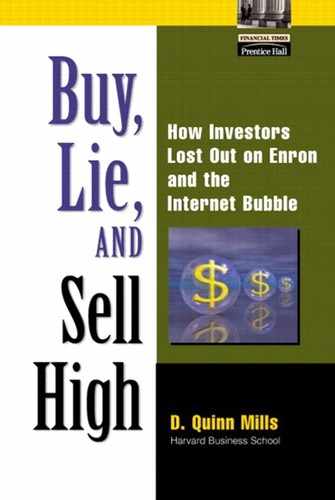Enron as an Internet Company
Before 1990 Enron was a rather ordinary company selling natural gas. At that time Enron Chairman Kenneth Lay brought in McKinsey and Company to study the firm's prospects. McKinsey recommended that Enron move into financial products and services, and over time Enron became an energy trader using modern information technology to build markets. McKinsey partner Jeffrey K. Skilling joined Enron and later became its CEO.
Along with its shift to energy trading, Enron announced that it was also adopting a more highly delegated management system—a nontraditional, flatter organization in which people were paid substantial sums via bonuses and stock options. Thus Enron not only claimed to be a new economy company by virtue of the innovative use of information technology, it remade itself to look like a new economy company.
On June 12, 2001, Jeff Skilling, then CEO of Enron, was the final speaker at the Strategic Directions technology conference in Las Vegas, where he shared with his audience his vision of Enron as the center of trading in cyberspace. As described by Kurt Eichenwald and Diana B. Henriques in The New York Times, “The executive who introduced Skilling noted that Enron was being hailed as 'America's most innovative company' and that Mr. Skilling had been declared 'the Number One C.E.O. in the entire country.'” With that, as a videotape played, Mr. Skilling bounded onto the stage, tieless and in a sports coat. The Internet, he told the crowd, had barely begun to show its usefulness to business. U.S. industry would be transformed by its prowess, and the future of Enron would be found there, he said. “We couldn't do what we're doing now without the technology of the Internet.”[20] Thus Enron, by changing its management structure, shifting the majority of its business to trading on the Internet, and by claiming to be a new economy company, made itself into an Internet company.
And it participated in the bubble. Its stock price rose rapidly as it announced striking increases in revenues and profits. However, it didn't collapse with the majority of the bubble companies when the bust began in early 2000. Instead, Enron was able to keep going well beyond the bursting of the bubble by taking steps that misled investors as to its financial situation and prospects. That it was an older company—not a dot-com start-up—and apparently a very large company kept away, the suspicions which investors directed at dot-coms.
Enron was also unusual in that it gave substantial sums to politicians and thereby obtained favorable legislation and regulatory rulings. Particularly valuable to the company were rulings permitting it to do certain things as it shifted its business from the old to the new economy; also very useful were rulings about what financial reporting was required of the company, and about the kind of accounting it was permitted to utilize. Political access helped Enron to grow more rapidly than other Internet companies, and deception enabled it to continue increasing its stock market value long after the bubble had burst for most new economy firms.
